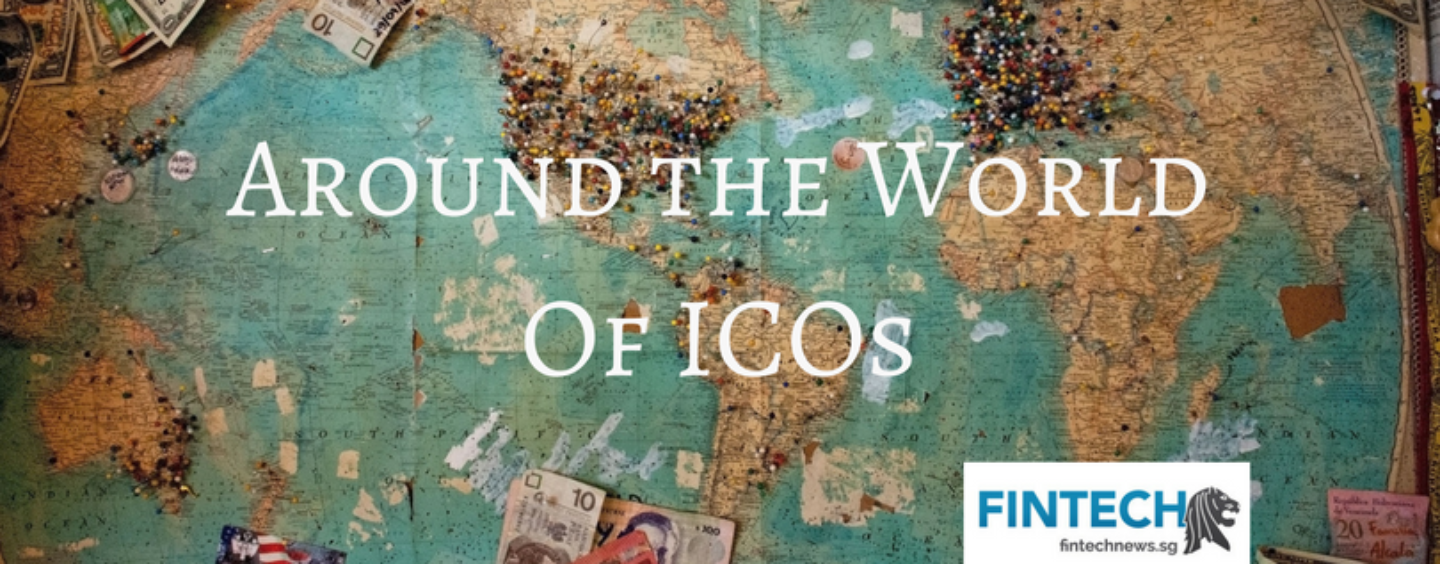Initial coin offerings (ICOs) have been all the rage these past years raising an estimated US$4 billion globally. An increasing number of startups, in the blockchain space and beyond, are opting for the novel fundraising method instead of traditional venture capital.
But as ICOs rise in popularity, these are becoming a key area of focus for regulators around the world who are warning about the unregulated nature of the practice in most jurisdictions. Regulation is coming rapidly for cryptocurrencies and ICOs, and countries have taken different approaches.
How are ICOs and cryptocurrencies regulated around the world? Here’s a a follow up article to our previous “State of ICO” piece posted in October 2017.
China
The People’s Bank of China banned all ICO activities in 2017 and ordered cryptocurrency exchanges to shut down. According to several reports released earlier this year, China is preparing a set of regulations to take effect in 2018 that would put an end to the ban over ICOs.
South Korea
Following the lead of China, South Korea’s Financial Services Commission announced in September 2017 the prohibition of ICOs, but recent reports suggest that the ban could be eased in the coming months.
European Union
In the EU, ICOs are allowed, given they are in adherence to AML/KYC policies as well as to required business regulations and licenses.
Switzerland
The Swiss Financial Market Supervisory Authority (FINMA) released ICO guidelines last month that detail how the authority is regulating ICOs and cryptocurrencies depending on their function and transferability. FINMA categorizes tokens in three types, payment tokens, utility tokens and asset tokens, but hybrid forms exist too. ICO activity in Switzerland is covered by money laundering, banking, securities and collective investment laws.
Liechtenstein
ICOs are allowed in Lichtenstein but depending on the rights attached to a certain token, applicability of securities and financial instrument law may apply.
Germany
ICOs are allowed in Germany. Regulation applicable to a token is dependent of the rights the cryptocurrency holds. An ICO may need to comply with current regulations including the Banking Act, Investment Act, Securities Trading Act, Payment Services Supervision Act, and Prospectus Acts.
Estonia
ICOs are allowed in Estonia and the government is even considering conducting its own token sale to raise funds.
Lithuania
ICOs are allowed in Lithuania. In some cases, current laws surrounding securities and money laundering may apply.
Russia
ICOs are allowed in Russia but the government is working on a regulatory framework. Russia has stated that securities laws may apply to ICOs and has required cryptocurrency miners registration and taxation. Last month, one of Russia’s government ministries proposed a law that, if approved, would introduce a capital requirement for ICO organizers.
United Kingdom
ICOs are allowed in the UK. The UK Financial Conduct Authority has issued warning to investors, stating that ICO projects are still experimental and therefore pose risks to investors. It has said that securities law and other areas of financial or banking law may apply to the issuance of a token depending on the different aspects and rights the token holder obtains through holding it.
Gibraltar
ICOs are allowed in Gibraltar. In October 2017, the government established a framework for regulating distributed ledger technology companies, which came into offer this year. It encompasses ICOs and subjects them to financial controls and standards.
Isle of Man
ICOs are allowed in the Isle of Man. The country is working on a regulatory framework that’s set to be introduced in the near future.
United States of America
ICOs are allowed in the US but regulations vary widely from state to state. On the federal level, ICOs are expected to be registered and licensed the same as if they were not ICOs. This includes registering with the Securities and Exchange Commission if the ICO is to sell or trade securities. ICO organizers are also expected to adhere to AML/KYC practices.
Canada
ICOs are allowed in Canada. The Canadian Securities Administration applies a four-factor test in determining whether a cryptocurrency have to be registered as securities. The factor test considers substance over form when considering: soliciting a broad base of investors, including retail investors; using the Internet, including public websites and discussion boards, to reach a large number of potential investors, attending public events, including conferences and meetups, to actively advertise the sale of the coins/tokens; and raising a significant amount of capital from a large number of investors.
Abu Dhabi
The Financial Services Regulatory Authority (FSRA) of the Emirate of Abu-Dhabi is planning to regulate cryptocurrencies and ICOs. According to Abu Dhabi regulator, digital currencies are “commodities” and the majority of ICOs will be regulated as “specified investments.” Tokens that are classified as “specified investments” (securities, shares, and bonds) fall under the FSMR regulation. The FSRA will determine whether a given ICO is subject to regulation on a case-by-case basis.
Israel
ICOs are allowed in Israel but the government wants to introduce regulation. The Israeli Securities Authority has announced that a panel was put in place to study how ICOs operate in the country. Israel also plans to introduce tax laws on ICO tokens and released earlier this year a draft circular detailing how domestic ICOs could be taxed.
Singapore
ICOs are allowed in Singapore. Last year, the Monetary Authority of Singapore (MAS) released guidelines regarding cryptocurrencies and ICOs. The guidance dictates that cryptocurrencies that are “capital market products” under the Securities and Futures Act can be regulated under the MAS. This includes cryptocurrencies that either infer an ownership interest in a corporation or product, debt, or a share in an investment scheme.
Japan
Last year, the Financial Services Authority said that depending on the structure used, ICOs may be regulated under Japanese law, including by the Payment Services Act and the Financial Instruments and Exchange Act. The authority is reportedly considering ICO regulations. Japan introduced cryptocurrency regulations last year, recognizing these as a legal method of payment. The law requires cryptocurrency exchanges to hold a special license to operate.
Thailand
ICOs are allowed in Thailand but unregulated. The central bank is preparing a framework to regulate cryptocurrencies.
Philippines
ICOs are allowed in the Philippines but regulators have said that some tokens might be considered as securities and thus must comply with securities registration regulations. The Philippines Securities and Exchange Commission is currently crafting rules to regulate cryptocurrency transactions.
Hong Kong
ICOs are allowed in Hong Kong. Regulators have said that certain tokens might be securities and should be treated as such.
Australia
ICOs are allowed in Australia but if an ICO or cryptocurrency falls under the Corporations Act, additional disclosures are triggered. For instance, an ICO might trigger a disclosure requirement if the ICO is a managed investment scheme MIS. A few other possible triggers of the Corporations Act involve, for instance, the ICO is being offered as a share of a company, as a directive, or as a non-cash payment.








